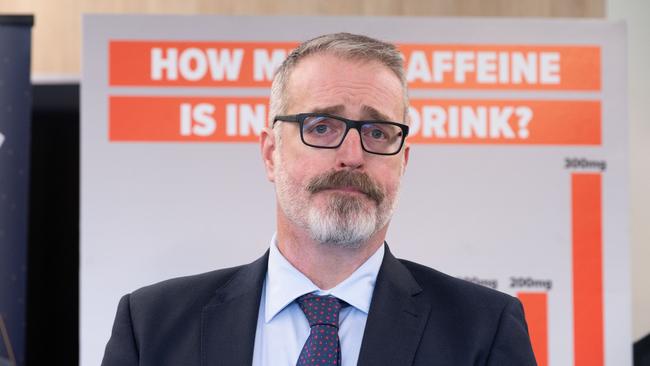‘Check the label’: Health warning as drinks pulled from shelves
Health officials have issued a warning over a popular drink product with increased risk of heart palpitations and chest pains.
Energy drinks with as much caffeine as nine cans of Coca-Cola have been removed from store shelves in a major crackdown blitz.
About 700 drinks were seized from South Australian retailers after it was revealed they contained as much caffeine as nine cans of Coca-Cola or three shots of coffee, nearly doubling the legal caffeine limit of 320mg per litre.
GFUEL, Bang and Raze Energy drinks were found with the most caffeine, with 300mg per 473ml can, while other energy drinks C4, Ghost, Ryse Fuel, 3D and Redcon 1 were found to contain 200mg of caffeine in cans of the same size.
Large amounts of caffeine can cause insomnia, anxiety and depression as well as cardiovascular issues, heartburn, ulcers, seizures, and in rare cases, death.
SA Health inspectors found 18 stores were selling the highly caffeinated drinks, with two businesses fined $3000 while 13 were issued warning letters.

Acting chief public health officer Chris Lease said they are working with retailers to educate them on the regulations.
“Often, these drinks are imported from overseas and retailers do not realise that they do not comply with our regulations,” he said.
“We’re working with retailers to educate them on the regulations and stop these drinks from making their way onto shelves, and issuing penalties to repeat offenders.”
Dr Lease also said eight holding orders have been placed on various non-compliant energy drinks brands by the Australian Department for Agriculture, Fisheries and Forestry.

SA Health Minister Chris Picton warned the high level of caffeine could be particularly harmful for children.
“Alarmingly, the products appear to be purposefully marketed towards teenagers,” he said.
“I’d encourage businesses to check that the energy drinks they sell comply with national food standards, and those purchasing energy drinks should always check the caffeine levels first.
“We’re actively working to remove the products from shop shelves, but it’s important that businesses play their part too by not importing or stocking these products in the first place.”





